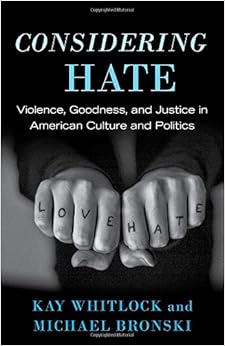A Great Conversation Starter - Considering Hate
I love it when a good conversation starts. You can tell when it happens, each party engages the other with animation and without animosity. Passion meets intellect while a back and forth ensues. This book is a great way to start one of those conversations.*
While reading, I found myself having one of those conversations internally with the authors of the book. The authors come from a very different perspective than my own, and this would not typically be a book I would just pick up and read. However, by forcing myself to consider their perspective through the discursive nature of their book, I have been able to expand my own response to the issues therein.
Considering Hate presents a counter-cultural narrative on how to combat violence and hate within America. Although most people view violent acts as atypical aberrant acts, the authors make the case that violent acts are more typically the expected outworking of a hate filled society. Hate as such is not the visceral, internalized feelings of those on the fringe of society. Instead, it is the product of a society which allows itself to be divided into groups of those who belong and those who are outsiders. In this breakdown, outsiders are seen as less than human and for this reason acts of violence are perpetrated against them in order to further humanize the group in control.
The main trope of the book, seen as an example on the cover, is that of love and hate as opposing sides of the same culture. The image comes from the films The Night of the Hunter and Do the Right Thing. In each of these films, love can only conquer hate by using equal measures of control, domination, and power to overcome hate. The problem with this metaphor may be found in its continuity with the culture of hate. How can a culture of hate be overcome with a love founded on the same assertions of dominance? In particular, preference for being part of one group and not another becomes the only reason for calling one type of action love and another one hate.
Within this context, the authors develop their case for the current inculcation of a culture of hate within American. Deeply embedded within our media lies an undercurrent of violence. The authors point out many examples from popular culture to illustrate this point. Throughout the book, fear is shown to be at the root of this culture of harm and hate. The recent growth and development of the prison state emphatically points to this facet of American culture.
If overcoming love with hate through an overwhelming show of opposite force is not the answer, then what is the solution?
Responsible action motivated toward healing, reparation, reconciliation, and transformation of the underlying conditions must change our society. In order for this to happen, those who create harm and violence must begin to work not only to end these actions but also to heal those wounds. Primarily, this must be done by ordinary people because this is a societal problem not a leadership one. In particular, if violence is the norm because we are a violent society, then we must work to change what society is if we want to be less violent. Leaders of our society are only as powerful as they are endowed to be as a reflection of our state of being.
The authors make a strong case for acts of intentional care and compassion. Only by reaching beyond our fear in love can we transcend hate. When we conquer our fear by seeing and treating other people groups as people, we may be able to transform our society into one of justice.
A quote from the end of the book is illustrative at this point:
"It is impossible to explore questions of goodness without a willingness to witness, examine, and resist brutality and inhumanity." (pg. 142)
The authors, Whitlock and Bronski, do a fine job of putting their case forward in an approachable and understandable way. At the end, I found myself wanting to engage in dialogue with those I may disagree with on social, economic, or political issues. A good book will do this, despite any reservations one may have with particular issues in the book. In fact, working through these disagreements in dialogue is the hallmark of a democratic society.
As a Christian, I love having books challenge my perspective and bring me back to Christ. Do I endorse everything in this book? No, but that is typical of many books. Did this book make me think and re-evaluate my approach to violence, hate, justice, compassion, and goodness? Absolutely. I think that makes it a profitable read for discerning Christians. After all, Christ calls us to serve and love, not control and hold power over others.
For any adult, I would encourage them to read this book so that conversations may happen. I believe people want to think they are good people. If we are to be a society that concerns itself with the issue of goodness we must be willing to carefully consider the case for a new type of love, one based upon what may be unfamiliar in giving up our power and position.
And finally, quoting from Barry Lopez's "Eden is a Conversation" piece:
"Conversations are efforts toward good relations." (pg. 138)
May we be people who have good relations with others.
*My thanks to Daniel Barks at Beacon Press who sent me a free review copy of the book, Considering Hate: Violence, Goodness, and Justice in American Culture and Politics by Kay Whitlock and Michael Bronski. Also, thanks to LibraryThing for facilitating the giveaway of review books like this one.



Comments
Post a Comment
Thanks for your comments. As soon as your comment has been screened and approved it will appear. Please remember that no hateful written speech, trolling, or advertising will be allowed.